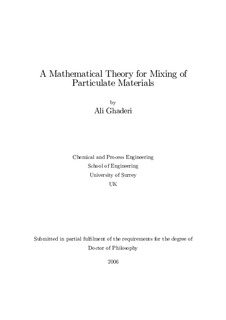A Mathematical Theory for Mixing of Particulate Materials
Abstract
A theoretical framework for sampling theory is developed. In this relation, concepts like mixture heterogeneity and representative samples are mathematically defined. Further, the relation between Gy's concepts of accuracy and reproducibility with mixture quality and the entropy of the sample distribution is established. Moreover, it is shown that within the developed framework, Lacey's conjecture is mathematically consistent. It is also shown that a consequence of the theory is the prediction of the number of key components of given size in random binary closed batch systems. It is also shown that this estimate is a function of microstructural properties of the mixture under study. Furthermore, this theory is used to develop a unifying approach to description of RTD of continuous systems.
These results are further used to develop a model for RTD of a commercial twin screw extruder. A new theoretical approach to the dynamics of the mixing processes is developed. In this context, the concept of heterogeneity landscape is introduced. It is argued that the valleys in the heterogeneity landscape correspond to different equilibrium states of the mixture. Further, it is shown that the valleys in the heterogeneity landscape can mathematically be described by heterogeneity equation and this would allow for classification of all the valleys. The characteristic function of the general solution to the heterogeneity equation is also determined. Moreover, it is shown that based on the mathematical model for the valleys, one can deduce that in the case of insufficient information about the mixture structure, the normal distribution, up to the second order; is the best distribution indescribing the mixture structure.
